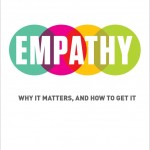My school’s professional readings this summer are centered on empathy, what it means and how focus on empathy in our work in school. I have no argument with any of the ideas presented in the book Empathy: Why It Matters and How To Get It, by Roman Krznaric.
In fact, I do think it is an area that needs to be addressed in my school and I look forward to the continued conversations as the school year unfolds. I have a strong belief in the use of literature to build empathy.
A recent article, Reading for pleasure builds empathy and improves wellbeing, highlights findings from a study on pleasure reading in the UK.
The impact of reading for pleasure and empowerment’ surveys research into the effects of reading for pleasure on people of a range of age groups and requirements. Among the benefits it finds are improved social capital for children, young people and the general adult population; better parent-child communication and reduction of depression and dementia symptoms among adults.
As a strong proponent of reading workshop, these findings come as no surprise. What is confounding is how so many people who make decisions about reading instruction do not see value in giving children two of the most important, essential ingredients for powerful reading: time and choice. The International Literacy Association has a position statement on Leisure Reading, also known as Recreational Reading, and states:
Research shows that leisure reading enhances students’reading comprehension (e.g., Cox & Guthrie, 2001),language (e.g., Krashen, 2004), vocabulary development(e.g., Angelos & McGriff, 2002), general knowledge (e.g.,Cunningham & Stanovich, 1998), and empathy for others(e.g., McGinley et al., 1997), as well as their self-confidenceas readers, motivation to read throughout their lives, andpositive attitudes toward reading (e.g., Allington & McGill-Franzen, 2003; Eurydice Network, 2011). The benefits ofleisure reading apply to English learners (ELs) who readin English as well as in their native languages. Becauseinteresting texts provide comprehensible input as well aspractice with reading, leisure reading offers many benefitsfor ELs.


One Comment
Leave a reply →